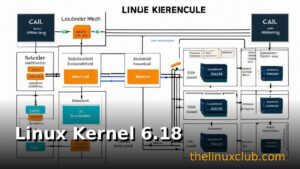Linux Skills Most Wanted: Open Source Jobs Report

🎯 Key Takeaways
- Introduction
- The 2018 Open Source Jobs Report: Key Findings
- Why Linux Skills Are Essential
- Container Technologies: The Second Most Wanted Skill
- Career Opportunities in Open Source
📑 Table of Contents
- Introduction
- The 2018 Open Source Jobs Report: Key Findings
- Why Linux Skills Are Essential
- Container Technologies: The Second Most Wanted Skill
- Career Opportunities in Open Source
- Essential Linux Skills to Learn in 2024
- How to Build Linux Skills
- Employer Perspectives on Open Source Talent
- Industry Trends Driving Linux Demand
- Salary and Compensation Trends
- Frequently Asked Questions
- Resources for Learning Linux Skills
- Conclusion
Introduction
The technology job market has undergone a dramatic transformation, with open source skills becoming the most sought-after qualifications in IT careers. According to the 2018 Open Source Technology Jobs Report from The Linux Foundation and Dice, Linux expertise has emerged as the single most valuable skill set for anyone entering or advancing in the tech industry.
📑 Table of Contents
- Introduction
- The 2018 Open Source Jobs Report: Key Findings
- Most In-Demand Skills
- Why Linux Skills Are Essential
- Market Drivers
- Industry Expert Perspective
- Container Technologies: The Second Most Wanted Skill
- Why Containers Matter
- Career Opportunities in Open Source
- Job Roles and Salary Expectations
- Essential Linux Skills to Learn in 2024
- Core Linux Competencies
- How to Build Linux Skills
- Learning Paths
- Top Certifications for Linux Professionals
- Employer Perspectives on Open Source Talent
- Hiring Challenges
- What Employers Value Most
- Industry Trends Driving Linux Demand
- Cloud Migration
- DevOps Adoption
- Container Revolution
- Edge Computing and IoT
- Salary and Compensation Trends
- 2024 Salary Benchmarks
- Frequently Asked Questions
- What Linux distribution should I learn first?
- How long does it take to become job-ready in Linux?
- Do I need a computer science degree for Linux careers?
- What’s the difference between Linux skills and DevOps skills?
- Are cloud certifications more valuable than Linux certifications?
- Can I learn Linux while working a full-time job?
- What programming languages should I learn alongside Linux?
- How important is contributing to open source projects?
- What’s the job market outlook for Linux professionals?
- Should I specialize or remain a generalist?
- Resources for Learning Linux Skills
- Free Training Resources
- Paid Training Platforms
- Conclusion
The seventh annual report from The Linux Foundation and Dice, released Wednesday, identifies Linux coding as the most sought-after open source skill. Linux-based container technology is a close second.
This shift reflects the fundamental role that open source software plays in modern technology infrastructure, from cloud computing and DevOps to containers and artificial intelligence. Understanding which skills are in demand can help IT professionals chart their career paths and employers identify the talent they need to drive innovation.
The 2018 Open Source Jobs Report: Key Findings
The report provides an overview of open source career trends, factors motivating professionals in the industry, and ways employers attract and retain qualified talent. As with the last two open source jobs reports, the focus this year is on all aspects of open source software and is not limited to Linux.
This year’s report features data from more than 750 hiring managers at corporations, small and medium businesses, and government organizations and staffing agencies across the globe. It is based on responses from more than 6,500 open source professionals worldwide.
Most In-Demand Skills
Linux skills rank as the most sought-after skills in the 2018 report, with 80 percent of hiring managers looking for tech professionals with Linux expertise.
- Linux Administration: 80% of hiring managers seek this skill
- Container Technologies: Docker, Kubernetes expertise in high demand
- Cloud Computing: AWS, Azure, OpenStack knowledge essential
- DevOps Practices: CI/CD, automation, infrastructure as code
- Security Skills: Linux security hardening, compliance
- Programming: Python, Go, Bash scripting for automation
Why Linux Skills Are Essential
Linux is required knowledge for most entry-level open source careers, likely due to the strong popularity of cloud and container technologies, as well as DevOps practices, all of which typically are based on Linux, according to the report.
Market Drivers
- Cloud Infrastructure: Major cloud providers (AWS, Google Cloud, Azure) run primarily on Linux
- Container Revolution: Docker containers and Kubernetes orchestration built on Linux
- DevOps Transformation: Automation and CI/CD pipelines leverage Linux tools
- IoT and Edge Computing: Embedded Linux powers billions of devices
- Enterprise Migration: Companies moving from proprietary to open source systems
Industry Expert Perspective
“Open source technology talent is in high demand, as Linux and other open source software dominates software development,” said Linux Foundation Executive Director Jim Zemlin.
“I am encouraged that companies are recognizing more and more each day that open source technology is the way to advance their businesses,” he continued. “The Linux Foundation, our members and the open source ecosystem are focused on ensuring training and certification opportunities are highly accessible to everyone who wants to seek them out, and we are supporting the developer community and its growth in every possible way.”
Container Technologies: The Second Most Wanted Skill
Why Containers Matter
Container expertise ranks as the second most in-demand skill, reflecting the industry’s shift to microservices architectures and cloud-native development.
- Docker Mastery: Understanding container creation, management, and optimization
- Kubernetes Expertise: Container orchestration at scale
- Container Security: Securing containerized applications and infrastructure
- Service Mesh: Istio, Linkerd for microservices communication
- Container Registries: Harbor, Docker Hub, private registry management
Career Opportunities in Open Source
Job Roles and Salary Expectations
Linux System Administrator
- Average Salary: $75,000 – $110,000
- Required Skills: RHEL/Ubuntu administration, scripting, networking
- Career Path: Senior SysAdmin → DevOps Engineer → Infrastructure Architect
DevOps Engineer
- Average Salary: $95,000 – $140,000
- Required Skills: Linux, CI/CD, Docker, Kubernetes, automation
- Career Path: DevOps → Site Reliability Engineer → Platform Engineer
Cloud Architect
- Average Salary: $120,000 – $180,000
- Required Skills: Linux, AWS/Azure/GCP, containerization, infrastructure design
- Career Path: Cloud Engineer → Solutions Architect → Principal Architect
Security Engineer (Linux Focus)
- Average Salary: $100,000 – $150,000
- Required Skills: Linux hardening, compliance, penetration testing, security automation
- Career Path: Security Analyst → Security Engineer → Security Architect
Essential Linux Skills to Learn in 2024
Core Linux Competencies
1. Linux System Administration
# Essential commands every admin should know
# User management
sudo useradd -m -s /bin/bash newuser
sudo passwd newuser
# Service management (systemd)
systemctl status nginx
systemctl enable --now docker
# Package management
dnf install -y httpd # RHEL/Fedora
apt install nginx -y # Debian/Ubuntu
# File permissions and ownership
chmod 755 /var/www/html
chown -R apache:apache /var/www2. Shell Scripting and Automation
#!/bin/bash
# Example automation script
# Backup script
BACKUP_DIR="/backup/$(date +%Y%m%d)"
mkdir -p "$BACKUP_DIR"
# Backup critical directories
tar -czf "$BACKUP_DIR/etc.tar.gz" /etc
tar -czf "$BACKUP_DIR/home.tar.gz" /home
# Upload to cloud storage
aws s3 sync "$BACKUP_DIR" s3://my-backups/
echo "Backup completed: $BACKUP_DIR"3. Container and Orchestration Skills
# Docker basics
docker build -t myapp:latest .
docker run -d -p 8080:80 myapp:latest
docker-compose up -d
# Kubernetes deployment
kubectl create deployment nginx --image=nginx
kubectl expose deployment nginx --port=80 --type=LoadBalancer
kubectl scale deployment nginx --replicas=3
kubectl get pods -o wide4. CI/CD and DevOps Tools
# Jenkins pipeline example
pipeline {
agent any
stages {
stage('Build') {
steps {
sh 'docker build -t myapp .'
}
}
stage('Test') {
steps {
sh './run-tests.sh'
}
}
stage('Deploy') {
steps {
sh 'kubectl apply -f deployment.yaml'
}
}
}
}How to Build Linux Skills
Learning Paths
Beginner Level (0-6 months)
- Install Linux (Ubuntu or Fedora) as primary OS
- Master command line basics and file system navigation
- Learn package management and system updates
- Practice shell scripting with simple automation tasks
- Complete Linux Foundation’s free intro courses
Intermediate Level (6-18 months)
- Study system administration (users, services, networking)
- Learn Docker and container technologies
- Explore configuration management (Ansible, Puppet)
- Practice with cloud platforms (AWS, GCP free tiers)
- Pursue entry-level certifications (LFCS, CompTIA Linux+)
Advanced Level (18+ months)
- Master Kubernetes and container orchestration
- Specialize in cloud architecture or security
- Contribute to open source projects
- Build complex automation and infrastructure as code
- Obtain advanced certifications (RHCE, CKA, CKAD)
Top Certifications for Linux Professionals
Entry Level
- Linux Foundation Certified System Administrator (LFCS) – Vendor-neutral, hands-on
- CompTIA Linux+ – Industry-recognized fundamentals
- LPIC-1 – Linux Professional Institute certification
Advanced Level
- Red Hat Certified Engineer (RHCE) – Enterprise Linux expertise
- Certified Kubernetes Administrator (CKA) – Container orchestration mastery
- AWS Certified Solutions Architect – Cloud architecture with Linux
- LPIC-3 – Senior-level Linux specialization
Employer Perspectives on Open Source Talent
Hiring Challenges
- Talent Shortage: 87% of managers report difficulty finding skilled Linux professionals
- Experience Gap: Entry-level candidates often lack hands-on experience
- Fast-Changing Landscape: Technologies evolve faster than training programs
- Remote Competition: Global talent pool increases competition for skilled workers
What Employers Value Most
- Hands-on Experience: Practical skills trump theoretical knowledge
- Problem-Solving Ability: Troubleshooting complex issues independently
- Automation Skills: Writing scripts and tools to improve efficiency
- Continuous Learning: Staying current with emerging technologies
- Communication Skills: Explaining technical concepts to non-technical stakeholders
- Open Source Contributions: Active participation in community projects
Industry Trends Driving Linux Demand
Cloud Migration
Organizations worldwide are migrating to cloud infrastructure, with Linux powering 90% of public cloud workloads. This creates sustained demand for professionals who understand both Linux and cloud platforms.
DevOps Adoption
The DevOps movement has made Linux essential for developers and operations teams alike. Automation, CI/CD pipelines, and infrastructure as code all rely heavily on Linux skills.
Container Revolution
Docker and Kubernetes have become standard deployment platforms, both built on Linux. Understanding Linux internals is crucial for effective container management.
Edge Computing and IoT
Billions of IoT devices and edge computing nodes run Linux variants, creating new opportunities for embedded systems professionals.
Salary and Compensation Trends
2024 Salary Benchmarks
| Role | Entry Level | Mid-Level | Senior Level |
|---|---|---|---|
| Linux Admin | $60K-$75K | $85K-$110K | $120K-$150K |
| DevOps Engineer | $75K-$95K | $110K-$140K | $150K-$200K |
| Cloud Architect | $90K-$120K | $140K-$180K | $200K-$250K+ |
| SRE | $80K-$100K | $130K-$160K | $180K-$230K |
*Salaries vary by location, industry, and company size. Tech hubs command 20-40% premiums.
Frequently Asked Questions
What Linux distribution should I learn first?
Start with Ubuntu for desktop use or CentOS/Rocky Linux for server administration. Ubuntu offers excellent documentation and community support for beginners, while RHEL-based distributions (CentOS, Rocky) are more common in enterprise environments.
How long does it take to become job-ready in Linux?
With dedicated study (10-15 hours/week), you can reach entry-level job readiness in 6-9 months. This includes mastering fundamentals, gaining hands-on experience, and earning a basic certification like LFCS or CompTIA Linux+.
Do I need a computer science degree for Linux careers?
No, many successful Linux professionals are self-taught or come from non-CS backgrounds. Certifications, hands-on experience, and demonstrable skills often matter more than formal degrees in the open source community.
What’s the difference between Linux skills and DevOps skills?
Linux skills are foundational – understanding the operating system, command line, and system administration. DevOps builds on this foundation, adding automation, CI/CD, containers, and cloud technologies. Strong Linux knowledge is prerequisite for effective DevOps work.
Are cloud certifications more valuable than Linux certifications?
Both are valuable and complementary. Linux certifications prove fundamental skills, while cloud certifications demonstrate platform-specific expertise. The best combination is a Linux certification (LFCS or RHCE) plus cloud platform certification (AWS, Azure, or GCP).
Can I learn Linux while working a full-time job?
Absolutely. Many professionals learn Linux through evening study, weekend projects, and online courses. Set aside 1-2 hours daily for hands-on practice, join online communities, and apply learning to work projects when possible.
What programming languages should I learn alongside Linux?
Focus on Bash scripting first (essential for automation), then Python (versatile, widely used in DevOps), and Go (popular for cloud-native tools). SQL and YAML are also valuable for database work and configuration management.
How important is contributing to open source projects?
Very important for career advancement. Open source contributions demonstrate real-world skills, collaboration ability, and passion for technology. They serve as a living portfolio that employers can review and often lead to networking opportunities.
What’s the job market outlook for Linux professionals?
Extremely positive. The Bureau of Labor Statistics projects 13% growth in computer and IT occupations through 2030, with Linux skills commanding premium salaries. Cloud adoption and digital transformation ensure sustained demand.
Should I specialize or remain a generalist?
Start as a generalist to build broad foundational skills, then specialize based on interests and market demand. Popular specializations include cloud architecture, security, site reliability engineering, or container/Kubernetes expertise.
Resources for Learning Linux Skills
Free Training Resources
- Linux Foundation: Free introduction courses and tutorials
- Linux Journey: Comprehensive beginner-friendly guide
- OverTheWire: Security-focused Linux challenges
- YouTube Channels: LearnLinuxTV, TechWorld with Nana, NetworkChuck
- Practice Labs: KillerCoda, Play with Docker, Katacoda
Paid Training Platforms
- Linux Academy (A Cloud Guru): Comprehensive video courses and labs
- Udemy: Affordable courses on specific Linux topics
- Pluralsight: Professional development platform
- Red Hat Training: Official RHEL courses and certifications
Conclusion
The 2018 Open Source Jobs Report confirms what industry insiders have known for years: Linux skills are the foundation of modern IT careers. With 80% of hiring managers actively seeking Linux expertise, professionals who invest in these skills position themselves for lucrative and rewarding careers.
The convergence of cloud computing, containerization, and DevOps practices has made Linux knowledge more valuable than ever. Whether you’re starting your IT career or looking to advance, mastering Linux opens doors to high-demand roles in system administration, DevOps, cloud architecture, and security.
The path forward is clear: build strong Linux fundamentals, gain hands-on experience, earn relevant certifications, and stay current with emerging technologies. The investment in Linux skills pays dividends throughout your career, with opportunities for growth, competitive salaries, and the satisfaction of working with cutting-edge open source technologies.
Start your Linux journey today – the demand for your skills is only growing stronger.
Read More: https://www.linuxinsider.com
Was this article helpful?
About Ramesh Sundararamaiah
Red Hat Certified Architect
Expert in Linux system administration, DevOps automation, and cloud infrastructure. Specializing in Red Hat Enterprise Linux, CentOS, Ubuntu, Docker, Ansible, and enterprise IT solutions.

